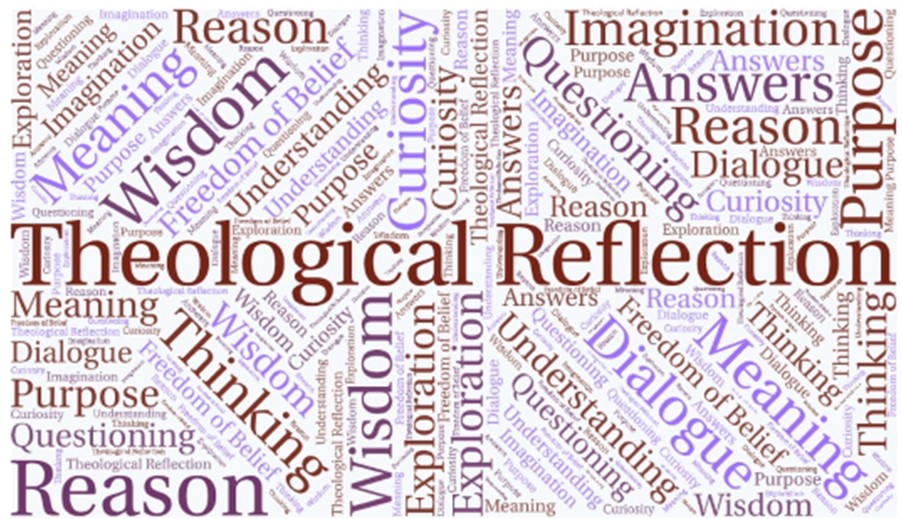
When the American Unitarian Association and the Universalist Church of America merged in 1961, a lot of time and care had gone into the practical logistics of defining a new organization. There was a new name, a new board, a new set of governing bylaws, a new financial base.
But as it took off, the fledgling Unitarian Universalist Association was still figuring out a very important aspect of a religious faith – what do we share theologically? And how do we speak of what’s sacred and wrestle with the things that are most important to us, while still holding the community at the center?
As Rev. Roberta Finkelstein later observed about the merger in 1961: “In fact, we seem to have dealt with the thorny issue of potential theological disharmony by essentially banning all theology from the newly formed movement!”
Over the decades since then, as our society has had to deal with harder and harder broader social issues, this permissiveness for theological atrophy has proven to be a disservice to our people and to our movement. Without taking the time to flex and develop that spiritual muscle in community, it leaves us all in a weakened state when we are confronted, personally or collectively, with a situation that breaks our heart, inflames our indignation at injustice, or knocks us off the rails of our expected trajectory.
So what do we mean when we’re talking about “theological reflection”?
While other religious traditions may define it as “talking about God,” we tend toward a more liberal definition. Whenever we’re asking the deeper questions that lead us into meaningful insights about our place in the world, we’re engaging in theological reflection. There are many different kinds of questions that can lead us onto that path of wisdom. There are some good starting points in this month’s Touchstones Journal. I hope you’ll check it out here: https://drive.google.com/file/d/1S-8-DmUriEayrV9qI5h7vxJhBmKmGA3e/view?usp=sharing
You might also be wondering, aside from independent reading, where else do we have an opportunity to practice engaging in theological reflection?
As a congregation, that’s what Sunday services are for. When we assemble as a community to listen to a prepared sermon, we are opening ourselves to the possibility of growth and learning. Sometimes we come seeking comfort. Sometimes we come seeking challenge. Hopefully, in any given service, we might find a bit of both. But when the collective group assembles for a service, it’s our chance as a community to be exercising those spiritual muscles and developing our theological aptitude. The more members of a congregation who assemble regularly for that shared development, the stronger and more resilient the congregation becomes as a whole. We need to come together to wrestle with those questions of deep meaning, deciding over time, as a community, what’s truly important and worthy of being lifted up and given value.
I hope you’ll choose to come to our upcoming services this month. Our Sunday Services Team has arranged for some diverse voices in the next few weeks:
- April 3 – Jewish Perspectives on God, with Saul Prombaum
- April 10 – A UU Theology of Ecology, with Rev. Leslie Mills
- April 17 – Water Rights, with David Boen
- April 24 – Buddhist Theology, with Shoken Winecoff
- May 1 – Woven in a Single Garment of Destiny, with UUA President Rev. Dr. Susan Frederick-Gray
And of course, there are many other ways to engage in theological reflection outside of services, too! Our congregation’s Covenant Groups provide a rich opportunity for connection and reflection, often using the Touchstones Journal (linked above) to guide their conversations. Our Adult and Children’s Religious Education programs offer a variety of events and classes to encourage our theological explorations and questions. You can even choose to bring your theological reflections to more casual group settings, such as our Outdoor Group – bring up an idea with a hiking buddy and have a chat while out in nature!
There’s no wrong way to do this important work, but there are so many rewards when we make the choice to engage it both individually and together.
As you’re engaging life’s important questions, supporting those conversations is part of your minister’s job – and lucky you, it’s easy to make an appointment to chat with me! If you have a topic that’s on your heart, and you feel like it would be helpful to have someone listen deeply to where that question is pulling you, I’d love to connect with you. You can email me with a few times that would work for you at minister@uulacrosse.org, or you can just click this link and sign yourself up: https://usemotion.com/meet/revlesliemills/meeting
As Rev. Charles Stephens wrote, “I wish for you the thrill of knowing, who you are, where you stand, and why. Especially why.”
In faith,
Rev. Leslie
